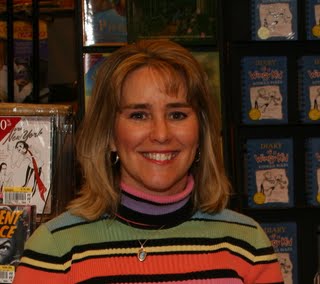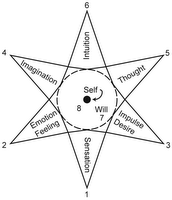Friday Speak Out: Use Your Intuition to Reach Your Subconscious Mind, Guest Post by Kelly L. Stone
Use Your Intuition to Reach Your Subconscious Mind
by Kelly L. Stone
"Women’s intuition” can be a useful tool for aspiring women writers because it’s a link to your inner resources of creativity and wisdom. Intuition is your subconscious mind attempting to communicate with you and get creative material or guidance into your conscious mind. You might experience hunches, flashes of insight, or feel you should take some action. Your dreams may give you characters, plot ideas, or entire stories. Some people get a “gut” feeling. You may be guided to do something unusual. The late photographer Dorothea Lange got a gut feeling that she should turn down a deserted road in California while driving home from work one day. Even though she was exhausted, Lange yielded to her intuition and discovered a starving woman and children whose haunting photo became the face of the Great Depression.
Intuition springs from your subconscious mind, and there are several ways to connect to this part of yourself that often goes unheeded and unexplored. You can direct your subconscious mind to give you a dream solution when you find yourself in a spell of writer’s block. Keep a notebook by your bed and tell your subconscious mind before you fall asleep to allow you to dream about the next section of your story. Don’t be surprised if you wake up in the middle of the night with a sudden burst of inspiration. That’s what the notebook is for.
You can also induce the hypnagogic state to get in touch with your subconscious resources. The hypnagogic state is a naturally occurring phase of sleep that is characterized by altered consciousness; some people hear their name being called, others see flashes of light. What’s important for writers is that ideas that are not normally connected are seen as associated in this state. It’s a time fertile with creativity. To access it, lie down and hold one arm straight up while you attempt to doze. The tension in your arm required to hold it up will keep you on the verge of wakefulness even as your mind slips into an alpha state, which is conducive to creativity. Again, write down in your notebook any ideas or insights that come to you.
Stream of consciousness writing is a good way to access your subconscious mind. I used it while writing my novel, Grave Secret (Mundania Press, Sept 2007). One day, after a period of several difficult writing days, the character of Billy Powers simply walked on to the page. This character was not known to my conscious mind; he sprang from my subconscious. As it turned out, he was so integral to the plot that his appearance saved the story.
Heed your intuition because it is the golden key that opens the gate to your vast subconscious mind. Your writing will thank you for it.
~~~~~~~~~~~~~~~~~~~~~~~~~~~~~~~~~~~~~~~~~~~~
 Kelly L Stone (www.KellyLStone.com) is a licensed mental health counselor and the author of three books, including TIME TO WRITE: More Than 100 Professional Writers Reveal How to Fit Writing Into Your Busy Life (Adams Media, January 2008) and THINKING WRITE: The Secret To Freeing Your Creative Mind (Adams Media, October 2009). Her third book for writers, LIVING WRITE: Creative Strategies for Maintaining Your Enthusiasm, Motivation, and Dedication to Your Writing Goals, will be released in Fall 2010.
Kelly L Stone (www.KellyLStone.com) is a licensed mental health counselor and the author of three books, including TIME TO WRITE: More Than 100 Professional Writers Reveal How to Fit Writing Into Your Busy Life (Adams Media, January 2008) and THINKING WRITE: The Secret To Freeing Your Creative Mind (Adams Media, October 2009). Her third book for writers, LIVING WRITE: Creative Strategies for Maintaining Your Enthusiasm, Motivation, and Dedication to Your Writing Goals, will be released in Fall 2010.
*****************
Do you want to reach WOW’s audience? We welcome short posts (500 words or less) from writers just like you! You can include your bio, pic, and links to your website/blog for promotion. Our only requirement is that your post be about women and writing. Send your Friday “Speak Out!” post to: marcia[at]wow-womenonwriting[dot]com for consideration.
****************
by Kelly L. Stone
"Women’s intuition” can be a useful tool for aspiring women writers because it’s a link to your inner resources of creativity and wisdom. Intuition is your subconscious mind attempting to communicate with you and get creative material or guidance into your conscious mind. You might experience hunches, flashes of insight, or feel you should take some action. Your dreams may give you characters, plot ideas, or entire stories. Some people get a “gut” feeling. You may be guided to do something unusual. The late photographer Dorothea Lange got a gut feeling that she should turn down a deserted road in California while driving home from work one day. Even though she was exhausted, Lange yielded to her intuition and discovered a starving woman and children whose haunting photo became the face of the Great Depression.
Intuition springs from your subconscious mind, and there are several ways to connect to this part of yourself that often goes unheeded and unexplored. You can direct your subconscious mind to give you a dream solution when you find yourself in a spell of writer’s block. Keep a notebook by your bed and tell your subconscious mind before you fall asleep to allow you to dream about the next section of your story. Don’t be surprised if you wake up in the middle of the night with a sudden burst of inspiration. That’s what the notebook is for.
You can also induce the hypnagogic state to get in touch with your subconscious resources. The hypnagogic state is a naturally occurring phase of sleep that is characterized by altered consciousness; some people hear their name being called, others see flashes of light. What’s important for writers is that ideas that are not normally connected are seen as associated in this state. It’s a time fertile with creativity. To access it, lie down and hold one arm straight up while you attempt to doze. The tension in your arm required to hold it up will keep you on the verge of wakefulness even as your mind slips into an alpha state, which is conducive to creativity. Again, write down in your notebook any ideas or insights that come to you.
Stream of consciousness writing is a good way to access your subconscious mind. I used it while writing my novel, Grave Secret (Mundania Press, Sept 2007). One day, after a period of several difficult writing days, the character of Billy Powers simply walked on to the page. This character was not known to my conscious mind; he sprang from my subconscious. As it turned out, he was so integral to the plot that his appearance saved the story.
Heed your intuition because it is the golden key that opens the gate to your vast subconscious mind. Your writing will thank you for it.
~~~~~~~~~~~~~~~~~~~~~~~~~~~~~~~~~~~~~~~~~~~~
 Kelly L Stone (www.KellyLStone.com) is a licensed mental health counselor and the author of three books, including TIME TO WRITE: More Than 100 Professional Writers Reveal How to Fit Writing Into Your Busy Life (Adams Media, January 2008) and THINKING WRITE: The Secret To Freeing Your Creative Mind (Adams Media, October 2009). Her third book for writers, LIVING WRITE: Creative Strategies for Maintaining Your Enthusiasm, Motivation, and Dedication to Your Writing Goals, will be released in Fall 2010.
Kelly L Stone (www.KellyLStone.com) is a licensed mental health counselor and the author of three books, including TIME TO WRITE: More Than 100 Professional Writers Reveal How to Fit Writing Into Your Busy Life (Adams Media, January 2008) and THINKING WRITE: The Secret To Freeing Your Creative Mind (Adams Media, October 2009). Her third book for writers, LIVING WRITE: Creative Strategies for Maintaining Your Enthusiasm, Motivation, and Dedication to Your Writing Goals, will be released in Fall 2010. *****************
Do you want to reach WOW’s audience? We welcome short posts (500 words or less) from writers just like you! You can include your bio, pic, and links to your website/blog for promotion. Our only requirement is that your post be about women and writing. Send your Friday “Speak Out!” post to: marcia[at]wow-womenonwriting[dot]com for consideration.
****************
Labels: Friday Speak Out, Kelly L. Stone, Women's intuition, Writers Intuition, writing inspiration












